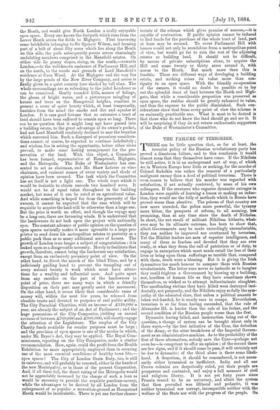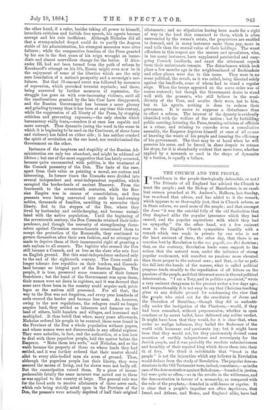THE FAILURE OF TERRORISM.
THERE can be little question that, so far at least, the terrorist policy of the Russian revolutionary party has proved a disastrous failure, and to this conclusion it would almost seem that they themselves have come. If the Nihilists be still active, it is in an underground sort of way, of which we in Western Europe hear little or nothing, for the murder of Colonel Sudeikin was rather the removal of a particularly malignant enemy than a deed of political terrorism. There is even reason to believe that his murder was regarded with satisfaction, if not actually contrived, by some of his own colleagues. If the creatures who organise dynamite outrages in London were capable of learning a lesson or making an induc- tion, they would see the folly of methods which in Russia have prov.ed worse than abortive. The prisons of that country are now more crowded, the police more powerful, the tyranny more bitter, the prospects of reform, to all seeming, less promising, than at any time since the death of Nicholas. In short, the net result of militant Nihilism hitherto, what- ever may be its ultimate outcome, has been to show that, albeit Governments may be made exceedingly uncomfortable, they can neither be improved nor overturned by terrorism. Yet the Nihilist leaders are men of superior intelligence, and many of them so fearless and devoted that they are ever ready, at what they deem the call of patriotism or of duty, to engage in enterprises which must needs entail the loss of their lives or bring upon them sufferings so terrible that, compared with them, death were a blessing. But it is giving the Irish dynamiters too much honour to compare them with Russian revolutionists. The latter were never so imbecile as to imagine they could frighten a Government by blowing up a building, nor, heedless of human life as they have sometimes shown themselves, so wicked as to attempt indiscriminate slaughter. The unoffending victims they have killed were destroyed inci- dentally, not purposely, and the Nihilists enjoy so fully the sym- pathy of the educated class, that unless a political assassin be taken red-handed, he is nearly sure to escape. Nevertheless, terrorism is so far from having succeeded, that the rule of Alexander III. is harder than the rule of his father, and the second condition of the Russian people worse than the first. Dynamite having failed, and insurrection being out of the question, a change of system can be brought about only in three ways,—by the free initiative of the Czar, the defection of the Army, or the utter breakdown of the Imperial Govern- ment as an administrative machine. As to the probability of the first of these alternatives, nobody save the Czar—perhaps not even he—is competent to offer an opinion ; of the second there are few signs, and if it should come to pass, it will certainly not be due to dynamite; of the third alone is there some likeli- hood. A despotism, it should be remembered, is not neces- sarily either tyrannical or inefficient. India and all our Crown colonies are despotically ruled, yet their people are prosperous and contented, and enjoy a full measure of civil and religious liberty. It is not yet forty years since Prussia ceased to be an autocracy, and albeit the system that then prevailed was illiberal and pedantic, it was neither tyrannical nor corrupt, incompatible neither with the welfare of the State nor with the progress of the people. On
the other hand, if a ruler, besides taking all power to himself, interdicts criticism and forbids free speech, his agents become corrupt and his rule inefficient. Although Nicholas did all that a strong-minded despot could do to purify the Augean stable of his administration, his strongest measures were utter failures ; while the comparative freedom of the Press granted by his son in the first years of his reign wrought an imme- diate and almost marvellous change for the better. If Alex- ander III. had not been turned from the path of reform by Korakasoff's attempt on his life, Russia might even now be in the enjoyment of some of the liberties which are the only sure foundation of a nation's prosperity and a sovereign's use- fulness. But that ill-omened event was followed by measures of repression, which provoked terrorist reprisals ; and these, being answered by further measures of repression, the struggle has gone on with ever-increasing violence, until all the ameliorations granted by the late Czar have disappeared, and the Russian Government has become a more gloomy and grinding tyranny than it has been at any time this century, while the suppression of all liberty of the Press, by stopping criticism and preventing exposure,—the only checks which bureaucracy really fears,—renders it at once less capable and more corrupt. Thus dynamite (using the word in the sense in which it is beginning to be used on the Continent, of sheer force and violence) has failed on either side; has neither crushed the spirit of revolution on the one han, nor revolutionised the Government on the other.
Instances of the ineptness and stupidity of the Russian Ad- ministration are only too abundant, and might be adduced ad libitum ; but one of the most suggestive that has lately occurred, because quite unconnected with politics, is the treatment of the Cossack peasantry of the Don. The facts of the case, apart from their value as pointing a moral, are curious and interesting. In former times the Cossacks were divided into several independent and semi-independent republics, which occupied the border-lands of ancient Muscovy. From the fourteenth to the seventeenth centuries, while the Rus- sian Empire was in course of consolidation, and free peasants were being converted into serfs by land-owning nobles, thousands of families, unwilling to surrender their liberty, fled to the steppes of the Don, where they lived by husbandry and cattle-keeping, and became assimi- lated with the native population. Until the beginning of the seventeenth century, the Don Cossacks retained their inde- pendence, and though the necessity of strengthening them- selves against Circassian encroachments constrained them to accept the protection of the Romanoffs, they continued to govern themselves after their own fashion, and no attempt was made to deprive them of their immemorial right of granting a safe asylum to all corners. The fugitive who crossed the Don still became a Cossack, and as free as the slave who sets foot on English ground. But this semi-independence endured only to the end of the eighteenth century. The Czars could no longer tolerate free republics on their borders, and Cossack- land became an integral part of the Russian Empire. The people, it is true, preserved some remnants of their former franchises ; but the hand of the Government was upon them, their names were set down in registers, and it was decreed that none save those born in the country could acquire such privi- leges as the natives still possessed. For all that, the way to the Don was not forgotten, and every year hundreds of serfs crossed the border and became free men. As, however, owing to the new regulations, the refugees could no longer acquire land, they settled as labourers and farmers on the land of others, built hamlets and villages, and increased and multiplied. .It thus befell that when, many years afterwards, Nicholas ordered his people to be counted, there were found in the Province of the Don a whole population without papers, and whose names were not discoverable in any official register. They were nobodies, in fact, and the authorities, at a loss how to deal with these paperless people, laid the matter before the Emperor. " Make them into serfs," said Nicholas, and so the waifs became the property of those on whose lands they had settled, and it was further ordered that their master should allot to every able-bodied man six acres of ground. Thus, although the paperless people lost their liberty, they were assured the means of living, and for slaves were not badly off. But the emancipation ruined them. By a piece of incom- prehensible fatuity the same measure was meted out to them as was applied to the country at large. The general rule was for the freed serfs to receive allotments of three acres each, which rule being strictly acted upon in the Province of the Don, the peasants were actually deprived of half their original allotments ; and no stipulation having been made for a right of way to the land that remained to them, which is often surrounded by the owner's estate, the proprietors are enabled to demand, and in many instances make them pay, more in road tolls than the annual value of their holdings. The worst offenders in this respect are the usurers and speculators, who, in too many instances, have supplanted patriarchal and easy- going Cossack landlords, and exact the uttermost copeck from their unfortunate tenants. The disturbances which took place a few months ago in the neighbourhood of Bochinskoie and other places were due to this cause. They were in no sense political, the revolt, as it was called, being directed solely against the landlords, some of whom had to stand a regular siege. When the troops appeared on the scene order was of course restored ; but though the Government desire to stand well with the peasants, who still believe in the semi- divinity of the Czar, and ascribe their woes, not to him, but to his agents, nothing is done to redress their grievances. It is easier to suppress a disturbance than to effect a reform. The interest of the dynasty is evidently identified with the welfare of the nation ; but by forbidding public meeting, fettering the Press, treating criticism of officials as a crime, and refusing to convoke even a consultative assembly, the Emperor deprives himself at once of all means of knowing the wants of his people and insuring the efficiency of his government. The time may be at hand when he will perceive his error, and be forced in sheer despair to retrace his steps, for it is abundantly evident that mere force, whether applied by a monarch or used in the shape of dynamite by a faction, is equally a failure.



































 Previous page
Previous page